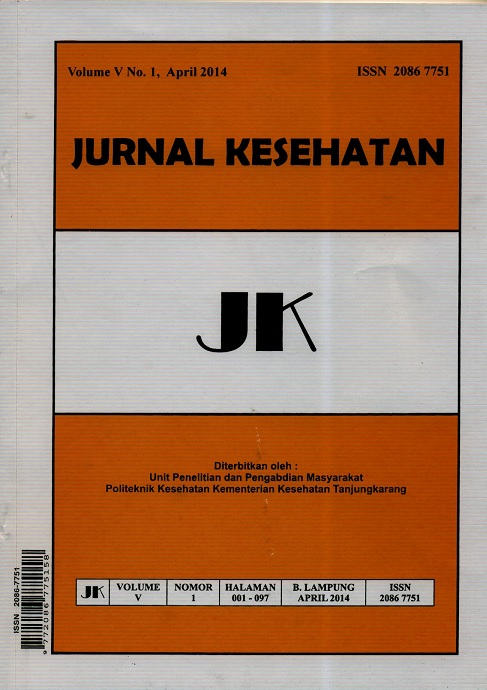PERILAKU SARAPAN PAGI ANAK SEKOLAH DASAR
DOI:
https://doi.org/10.26630/jk.v5i1.72Abstract
Irina Meriska1)
Kodrat Pramudho1)
 Bambang Murwanto1)
1)Program Pascasarjana Kesehatan Masyarakat Stikes Mitra Lampung
Â
Abstract :The Behavior Of Breakfast In Elementary School Child. In Indonesia, the adequacy of nutrition of school-age children is not sufficient that the average energy consumption adequacy was 44.4% and the average adequacy konumsi protein is 30.6%. The morning breakfast was part of the behavior to achieve balanced nutrition essential for healthy living, active and intelligent. The purpose of this study was to determine the factors associated with the behavior of elementary school children breakfast in the Village Kemiling Permai, District Kemiling, Bandar Lampung in 2013. This research is a quantitative study with cross sectional approach. The study population was all students in grade IV, V, and VI in the Academic Year 2013/2014 is in the  Kemiling Pemai, covering public school students and private elementary school. The total population of this research is numbered 848 students. The sample size was 106 students and analyzed using chi square test and logistic regression. This research was conducted in December 2013.The results showed no relationship between children's nutrition knowledge (p = 0.001), the availability of food for breakfast (p = 0.005), family support (p = 0.001), and the role of the teacher (p = 0.001) with the behavior of a full breakfast. There is no relationship of nutrition attitude (p = 0.721), mother's occupation (p = 0257), father's education (p = 0.707), maternal education (p = 1.000) with the behavior of a full breakfast. Multivariate analysis showed the availability of food for breakfast is the most dominant variable that is related to the behavior of a full breakfast with a value of OR = 5.673.
Â
Keywords:Behavior, Breakfast, Elementary School Child
Â
Abstrak: Perilaku Sarapan Pagi Anak Sekolah Dasar. Di Indonesia, tingkat kecukupan gizi anak usia sekolah belum cukup memadai yaitu rata-rata kecukupan konsumsi energi adalah 44.4% dan rata-rata kecukupan konumsi protein adalah 30.6%. Sarapan pagi merupakan bagian dari perilaku untuk mewujudkan gizi seimbang yang penting bagi hidup sehat, aktif dan cerdas. Tujuan dari penelitian ini adalah untuk mengetahui faktor-faktor yang berhubungan dengan perilaku sarapan pagi anak sekolah dasar di Kelurahan Kemiling Permai, Kecamatan Kemiling, Kota Bandar Lampung Tahun 2013.Penelitian ini merupakan penelitian kuantitatif dengan pendekatan cross sectional study. Populasi penelitian adalah seluruh siswa SD kelas IV, V, dan VI Tahun Pelajaran 2013/2014 yang ada di Kelurahan Kemiling Pemai, meliputi siswa SD negeri dan SD swasta. Total populasi penelitian ini adalah berjumlah 848 siswa. Besar sampel adalah 106 siswa dan analisis data menggunakan uji chi square dan regresi logistik. Penelitian ini dilakukan pada bulan Desember 2013.       Hasil penelitian me-nunjukkan ada hubungan antara pengetahuan gizi anak (p=0.001), ketersediaan makanan untuk sarapan pagi (p=0.005), dukungan keluarga (p=0.001), dan peran guru (p=0.001) dengan perilaku sarapan pagi. Tidak ada hubungan sikap gizi (p=0.721), pekerjaan ibu (p= 0.257), pendidikan ayah (p=0.707), pendidikan ibu (p=1.000) dengan perilaku sarapan pagi. Hasil analisis multivariat menujukkan ketersediaan makanan untuk sarapan pagi merupakan variabel yang paling dominan yang berhubungan dengan perilaku sarapan pagi dengan nilai OR = 5,673.
Kata Kunci: Perilaku, Sarapan Pagi, Anak Sekolah Dasar
Downloads
Published
Issue
Section
License
Authors who publish in this journal agree to the following terms:
- Authors retain copyright and grant the journal right of first publication with the work simultaneously licensed under a Creative Commons Attribution License (CC BY-SA 4.0) that allows others to share the work with an acknowledgment of the work's authorship and initial publication in this journal.
- Authors can enter into separate, additional contractual arrangements for the non-exclusive distribution of the journal's published version of the work (e.g., post it to an institutional repository or publish it in a book), with an acknowledgment of its initial publication in this journal.
- Authors are permitted and encouraged to post their work online (e.g., in institutional repositories or on their website) prior to and during the submission process, as this can lead to productive exchanges and earlier and greater citations of published work.












